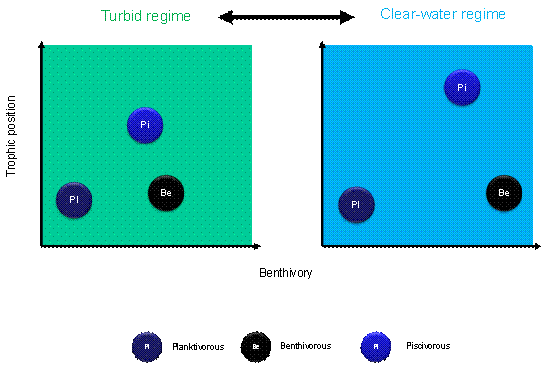
Contrasting Energy Mobilizations as a Consequence of Regime Shifts
Aug 05, 2014 Email"> PrintText Size

Ecological regime shifts typically result in abrupt changes in ecosystem structure through several trophic levels, which leads to rapid ecosystem reconfiguration between regimes. An interesting aspect of regime shift impact is that the alternative regimes may induce distinct shifts in the energy mobilization, which is less tested than structural changes.
The research group led by Dr. XU Jun at Institute of Hydrobiology, Chinese Academy of Sciences (IHB) addresses this need by using stable isotopes for establishing the energy mobilization in fish communities. They specifically focus on the impact of regime shift on changes of the energy pathways, and how the magnitude and direction of these changes are affecting the local community.
They found energy mobilization significantly varied among the planktivorous, benthivorous, and piscivorous trophic guilds as a result of the alternative regimes. The regime shift from clear to turbid state altered the food web towards planktonic energy mobilization and truncated food chain length, indicative of less ecological efficiency. These structural and functional characteristics of trophic interactions might not facilitate the classic trophic cascading effects in such a turbid regime and suppress the system’s response to environmental changes, e.g. nutrient loading, and restoration efforts in turbid to clear water regime shifts.
This work was published online in Oecologia with the title "Contrasting energy pathways at the community level as a consequence of regime shifts". 
Responses of functional groups to regime shifts in foodweb niche space (Image by IHB)
Ecological regime shifts typically result in abrupt changes in ecosystem structure through several trophic levels, which leads to rapid ecosystem reconfiguration between regimes. An interesting aspect of regime shift impact is that the alternative regimes may induce distinct shifts in the energy mobilization, which is less tested than structural changes.
The research group led by Dr. XU Jun at Institute of Hydrobiology, Chinese Academy of Sciences (IHB) addresses this need by using stable isotopes for establishing the energy mobilization in fish communities. They specifically focus on the impact of regime shift on changes of the energy pathways, and how the magnitude and direction of these changes are affecting the local community.
They found energy mobilization significantly varied among the planktivorous, benthivorous, and piscivorous trophic guilds as a result of the alternative regimes. The regime shift from clear to turbid state altered the food web towards planktonic energy mobilization and truncated food chain length, indicative of less ecological efficiency. These structural and functional characteristics of trophic interactions might not facilitate the classic trophic cascading effects in such a turbid regime and suppress the system’s response to environmental changes, e.g. nutrient loading, and restoration efforts in turbid to clear water regime shifts.
| |
| Responses of functional groups to regime shifts in foodweb niche space (Image by IHB) |
CAS Institutes
There are 124 Institutions directly under the CAS by the end of 2012, with 104 research institutes, five universities & supporting organizations, 12 management organizations that consist of the headquarters and branches, and three other units. Moreover, there are 25 legal entities affiliated and 22 CAS invested holding enterprisesThere are 124 I...>> more
Contact Us

Chinese Academy of Sciences
Add: 52 Sanlihe Rd., Xicheng District, Beijing, China
Postcode: 100864
Tel: 86-10-68597592 (day) 86-10-68597289 (night)
Fax: 86-10-68511095 (day) 86-10-68512458 (night)
E-mail: cas_en@cas.cn

